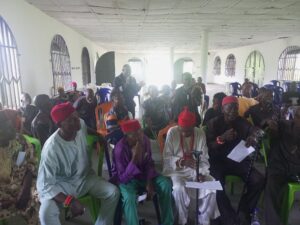A town hall organized by Spaces for Change | S4C in Assa community, Ohaji Egbema local government area (LGA) of Imo State, brought together 86 community representatives, including the traditional prime minister, Eze cabinet members, women, and the youth to reflect on the progress being made in establishing Host Community Development Trusts in communities hosting oil and gas exploration and production activities consistent with the provisions of Chapter 3 of the Petroleum Industry Act (PIA). Signed into law in August 2021, Section 240 (2) of the new petroleum law requires extractive corporations (or operators) to set up and contribute three (3) percent of their actual annual operating expenditures to the Host Communities’ Development Trust Fund (HCDTF). The operators with existing oil mining leases, existing designated facilities, and new designated facilities under construction are required to establish these trusts within 12 months from the PIA’s effective date, as a vehicle for delivering social and economic benefits to the communities hosting major extractive projects.
Assa is home to the Assa North Ohaji South (ANOH) Gas Development Project which is the largest greenfield gas condensate development in Nigeria, operated by Shell Petroleum Development Company (SPDC) and Seplat Petroleum Development Company. The May 17 town hall offered a platform for community representatives to understand the various governance structures prescribed by law that the operators must put in place to enhance the implementation of the HCDT in their community. Along this line, operators have an obligation to set up the Board of Trustees, the Management Committee, and Advisory Committees populated by members and representatives of their community. The inclusion of women in these committees is equally imperative. To monitor compliance with these statutory prescriptions, the Nigerian Upstream Petroleum Regulatory Commission (NUPRC) recently introduced the Industrial Digital Automated Portal (IDAP) for effective monitoring of the HCDT and tracking the fulfillment of obligations to the host communities.
As further enunciated in the Community-Investor Guidelines, S4C executives enlightened the participants about the provisions of Chapter 3 of the PIA, highlighting their rights and entitlements as host communities and the duties of the operators towards them. Armed with that knowledge, community members appraised the progress that has been made in setting up the HCDT. Significant progress made so far include the composition of members of the Board of Trustees and Management Committees, pending formal incorporation, by one of the ANOH operators. Beyond the positive strides, community representatives raised concerns about bridging the historically-wide gaps between policy and practice. For instance, communities want the establishment of these committees to translate into job creation for local youth, the provision of basic amenities, and general improvement in social and economic conditions of local people. Not only that, setting up these trusts does not extinguish the duty of the state and local government authorities to deliver democratic dividends to the host communities.
Concerns were also raised regarding environmental pollution and the adverse effects of oil and gas extraction in the locality. Addressing these concerns, S4C shed light on the Nigerian government’s commitment to phase out fossil fuels and embrace cleaner energy sources by 2060, driven by the need to address climate change and reverse the decades of environmental damage associated with fossil fuel extraction. Participants also learned about the opportunities and strategies for engaging in the energy transition discourse and bolstering community participation in the awaited green economy.
This town hall forms part of the organization’s broader strategy to advocate for the inclusion and meaningful participation of host communities in the HCDT governance structures currently being established in the oil and gas-rich communities across the country. S4C proceeds upon the premise that informed and empowered communities are better positioned to negotiate the benefits of natural resources more effectively and sustainably. At the end of the program, community leaders thanked S4C for the empowerment program and pledged to ensure that community trusts are established and operated according to the full dictates of the law.




